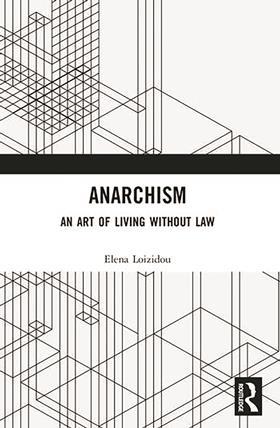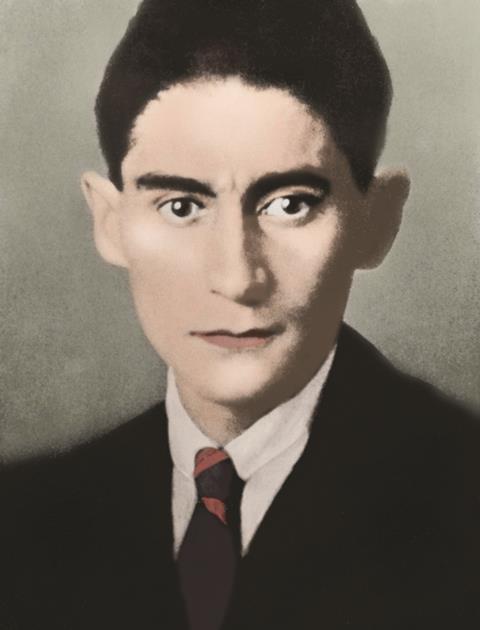Anarchism: An Art of Living Without Law
Elena Loizidou
£39.99, Routledge
★★★★✩
In 1997, Elena Loizidou concluded a book review with the question ‘how can a site of a more generous justice be symbolised?’. Her question is answered – in part – by her own work.
At the outset, I state that I accept the invitation she makes at the end of her book, which is to join her in the thinking of being a (liberated) ‘We’ as opposed to the oppressed ‘I’. The invitation is to join her in a project she describes, as I understand it, as that of being in a community outwith the law, where law and capital have been abandoned and where hope and care are sovereign.
Law here is both that of juridical forms (including a governing magistrate – a definition of anarchism to be without a governing magistrate) and that linked to attachment and desire in psychoanalytic terms.
This ‘I’ is subject to a state apparatus of violent subjugation of our will. This is a state of exception in a contract which can never be discharged in terms of a binding agreement and, in 2025, appears to be a permanent breach of that contract, as articulated by Locke and Rousseau.
I note that ‘in part’ the project described in this work is successful, because here is a compelling exposition of the practice of ‘living’ anarchism as living without law. The project is explained as one of how to have a world – a way of being in the world, of acting in the world – that can foster equality, freedom and justice if the attachment to law is abandoned.

Attachment, in psychoanalytic terms, is a keyword here. To detach ourselves from our desire for law and the apparent slippage of our own responsibility for living ethically, absent the violence of the law, through which capital and state are violently transcribed upon the subject (as in Kafka’s parable In The Penal Colony).
The desire for law is challenged in this project through three forms of intervention. First, disentanglement from the habit of law as an act of fearful obedience (as in Kafka, pictured), in the speech-act of parrhesia: free speech that is ‘frank, truthful, critical’ (Chapter 3). Second, the chaos of the economies of love and Eros (Chapter 4) revelling in the undermining of the claim to authenticity of the power of capital. Third, through the joy of laughter (Chapter 5) and a revelling in humour and the authenticity of carnival, as opposed to Antigone’s ‘death politics’ and her fatal and tragic commitment to Creon’s authenticity of violence. As the author concludes, parrhesia, humour and love embrace ‘ambivalences as characteristics of an anarchist art of living’.

There are flaws in the execution of this project. First, I accept the significance of the contribution of Emma Goldman to the out-workings of the anarchist project in the 20th century. However, her biographical presence becomes repetitive within the narrative. Second, the author imposes her own acts within her account, specifically as a legal observer at ‘The Carnival for Full Enjoyment’. Her role as ethnographer in the acts of festival (‘the world turned upside down’) is an anachronistic act of academic indulgence, attempting to establish her authenticity in the anarchist project she describes.
Third – and this is where the dialogue she opens through the invitation she makes at the start of the project – is the flaw of reliance on mutual aid as an alternative to capitalism and the institutions of state apparatus, including those of law. Peter Kropotkin’s anarcho-communist vision, as described here, was of society not commanded by profit, prejudice and tradition, but rather ‘made possible by mutual aid … and the distribution of wealth of all according to their need’.
My problem, my lack of vision, is to see this as a community of selves, not slaves, of a community of love and laughter liberated from and detached from the yoke of law-capital. The contemporary disruptive interventions described by Loizidou are occurring, as capital and ‘traditional’ juridical forms of law are constantly evolving as a new global politics of fear and insecurity and meta-inauthenticity.
Carnivals of love and laughter are a response to this new global politics of cyber-profit, the marketing of fear and inauthenticity. A community of ‘not for profit’, for care and for joy, outwith the law, can be achieved even when marked by the constancy of failure. But I am consumed by an Orwellian dread, despite accepting Elena’s invitation.
Christopher Stanley is a litigation consultant at KRW Law, Belfast and London































No comments yet